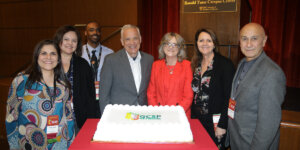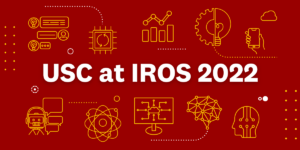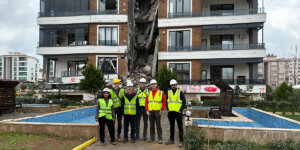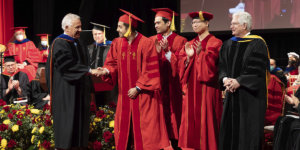Joshua Yang, professor of electrical and computer engineering at the USC Ming Hsieh Department of Electrical and Computer Engineering, has secured funding from the U.S. Air Force to create a Center of Excellence based on his work on neuromorphic computing.
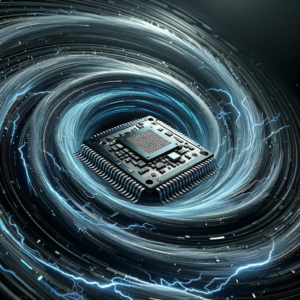
(Credit: Mingyi Rao and Glenn Ge. Memristor AI chip under extreme space environment. Joshua Yang. This image was generated with the assistance of AI.)
Yang and USC will lead the center, which also includes researchers from UCLA, Duke University, the University of Texas-San Antonio, and the Rochester Institute of Technology. The entity is called the Center of Neuromorphic Computing and Extreme Environment, or CONCRETE.
A review panel from the Air Force’s Office of Scientific Research and the Air Force Research Laboratory (AFRL) unanimously recommended five years’ worth of funding, based on a proposal titled “Extreme Neuromorphic Materials and Computing.”
Neuromorphic computing is a type of computer engineering modeled after the function of the human brain and nervous system. “A major part of the effort is to build machine-learning or AI accelerators,” Yang said. “They are inspired by the human brain, learn from the brain, and they approach the efficiency of the brain.”
“The brain is the most energy-efficient computer known so far — way better than any supercomputer,” Yang added. “Orders of magnitude better, because we actually consume much less energy. Moreover, the brain can learn much faster and is much more error-tolerant, and much more adaptive to the environment. We tend to learn more and emulate more, so that we can build a much better computing system that’s more sustainable and faster and more robust.”
Sustainability is at the heart of the “Extreme Environment” portion of the CONCRETE acronym. Defense labs, including those at the Air Force, need computer systems that can function under less-than-ideal conditions.
Another pivotal objective of the center is to fortify collaborations between universities and the AFRL, with a focus on educating the workforce in anticipation of future computing requirements for the Department of Defense (DoD).
Securing this esteemed award to establish a center on neuromorphic computing aligns seamlessly with USC’s recent launch of the Frontiers of Computing.
Published on January 18th, 2024
Last updated on March 7th, 2024





